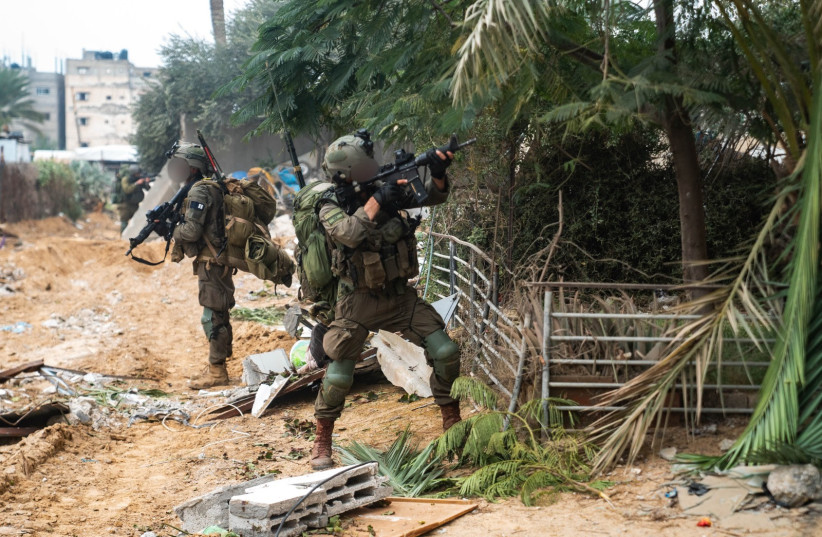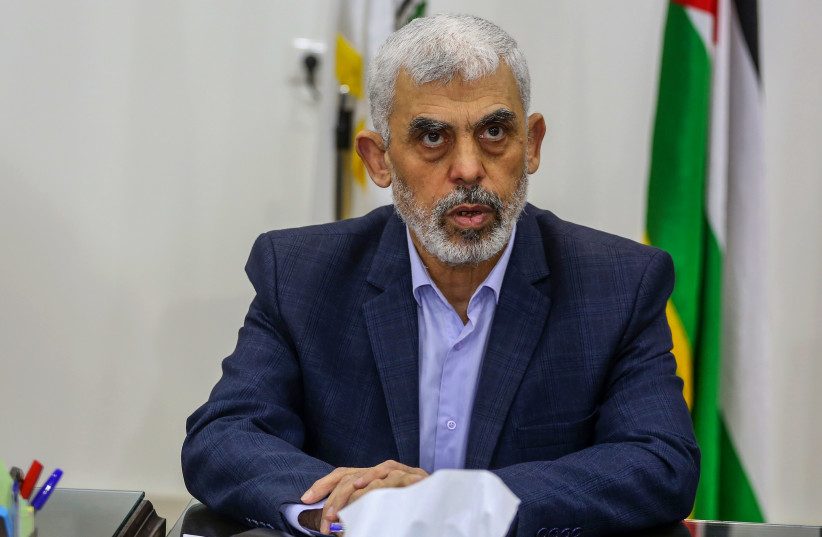Israel-Hamas hostage deal: Did the IDF misjudge Sinwar’s desire to live?
Is Israel’s entire strategy to recover the hostages from Hamas based on a false assumption? A visit to Khan Yunis on Thursday helped crystallize something that had been alluded to by a few Israeli political and defense officials.
To wit: Perhaps Israel thinks it can surround Hamas leader Yahya Sinwar to the point where he believes his choices are to either cut a hostage deal – including an end to Hamas’s rule – in exchange for his life, or he can die a martyr while taking some hostages with him?
This question is at the heart of Israel’s strategy, and it is not clear that there is a Plan B for what to do if Sinwar is ready to die.
Is Yahya Sinwar ready to die?
If he is, it would seem that Israel’s only two remaining choices would be to either cave into Hamas’s demands to halt the war – without dismantling it – or launch a military operation to rescue the hostages, which could miraculously succeed or end in tragedy.
There is, though, a third option: Continue the war long enough to take control of nearly the entire Gaza Strip, except for where Sinwar is hiding, declare the “main war” completed, and start an extended game of chicken for an indefinite period to wear Sinwar down.
But that strategy relies on an important premise: that Sinwar will eventually choose to live and will not agree to die a martyr.

Given that playing field, does this premise make sense?
There is evidence that Sinwar wants to live. If he were aching to be a martyr, he might have stayed, fought, and held the line at one of the key Hamas sites in Gaza City in northern Gaza in mid-November.
Instead, we know that at some point, Sinwar fled to southern Gaza to live another day.
It is also possible that the last and current round of negotiations over hostages shows his rationality as an actor.
He was willing to give 81 hostages back to Israel to get a breather and angle for a ceasefire, something that someone who simply wants to die a “glorious” martyr would not have done.
Even as Sinwar rejects Israel’s offers for more hostage deals, he continues to express an openness to returning more hostages, as opposed to rushing to die in the battles at Khan Yunis.
But all of these judgments may be mistaken, just as Israel misjudged Sinwar for years, leading up to the surprise attack he coordinated on October 7.
For years, Israeli intelligence viewed him as a lightweight who was afraid to get into any significant fights and mostly wanted to hold control of Gaza, with all its limitations.
In 2018, when Sinwar pushed the strategy of mixing nonviolent border protests with low-grade violent attacks on IDF guards, Israeli intelligence viewed him as willing to use less-daring tactics to achieve geopolitical goals – all without risking too much.
Each time Israel fought Palestinian Islamic Jihad, and Hamas stayed out of the fighting, Israeli intelligence concluded that Sinwar was extremely deterred from taking the risk of angering the IDF too much.
October 7 completely shattered that paradigm.

Israeli intelligence started to talk about him as a pernicious, pathological liar, a megalomaniac who was willing to take risks to place his stamp on the history of Palestinian terrorism against the Jewish state.
Yet, even after Sinwar’s brilliantly concocted October 7 plans and his years of fooling Israeli intelligence and luring Jerusalem into complacency, almost every Israeli defense official still views him as a mostly rational actor.
They say he misjudged Israel and never thought that the “spoiled” Israelis of 2023 would be ready to fight a deep and bloody war in the heart of Gaza. Yet they have.
Had he known that the IDF would do to Gaza what it did, he would never have ordered the invasion or would have modified the plans to try to mitigate Israel’s fury, they say.
But what if that is not true?
What if he gambled on October 7 because he would rather die a martyr and fight a bloody war, killing many Israelis, including many hostages, than remain a weak-looking ruler of a weak Gaza in a mostly undeclared extended ceasefire with the Jewish state?
What if the only reason he made the original hostage deal was in the hope that it would force the IDF entirely out of Gaza, and that this is his final negotiation position?
What if negotiations are destined to fail – unless Israel changes its premise of who Sinwar is and how far he is willing to go?
Maybe he is only willing to cut a deal that lets him control Gaza and hold onto the victory of October 7. Or perhaps he would rather die.
If anything can be gleaned from Khan Yunis, it is that there is still some time before this issue reaches its peak. But as the IDF continues to make progress, not much more time is left.





Comments are closed.